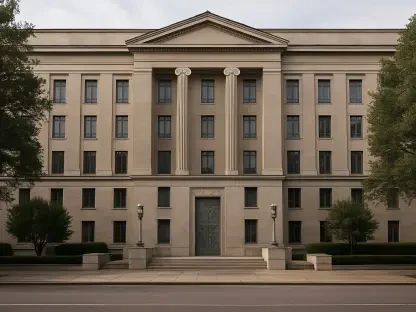What if a slice of paradise in the Maldives could be owned with just a click, without the burden of millions in upfront costs? Picture a world where luxury real estate, once the playground of the ultra-wealthy, opens its doors to everyday investors through digital innovation. The Trump International Hotel Maldives, a breathtaking project in the heart of the Indian Ocean, is turning this vision into reality by pioneering tokenization—a blockchain-based method that’s reshaping how property investments are made. This isn’t just about opulent villas; it’s about a seismic shift in financial access and opportunity.
The significance of this development extends far beyond turquoise waters and sandy beaches. Tokenization, as showcased by this resort, represents a transformative leap in real estate, breaking down barriers to entry and allowing fractional ownership of high-value assets. With completion slated for late 2028, this collaboration between the Trump Organization and Saudi-based Dar Global is not just building a resort—it’s laying the groundwork for a new era of investment. As blockchain technology gains traction, the implications for global markets are staggering, promising both unprecedented access and complex challenges.
A Luxury Resort Redefining Investment: What’s the Buzz?
Nestled just 25 minutes by speedboat from Malé, the capital of the Maldives, the Trump International Hotel Maldives is poised to become a beacon of extravagance with 80 beach and overwater villas. Yet, the real allure lies not in its stunning design but in its groundbreaking approach to ownership. By leveraging tokenization, this project allows investors to purchase digital shares early in the development process, effectively democratizing access to a market once reserved for the elite.
This isn’t merely a tropical escape; it’s a bold statement in financial innovation. The resort stands as a test case for blending high-stakes real estate with cutting-edge technology, creating a model that could redefine how luxury properties are funded and owned. Investors from diverse backgrounds can now stake a claim in a piece of paradise, a concept that’s generating significant excitement in both real estate and tech circles.
The buzz surrounding this initiative highlights a growing curiosity about how traditional industries can evolve. With tokenization, the barriers of hefty capital requirements are dismantled, offering a glimpse into a future where owning a share of a five-star resort is as simple as trading stocks. This project is a catalyst, sparking discussions on accessibility and the potential reshaping of investment landscapes worldwide.
The Bigger Picture: Why Tokenization Is a Game-Changer
Tokenization is more than a buzzword; it’s a fundamental shift in how real estate intersects with blockchain technology. By recording ownership of physical assets like property on a digital ledger, this method enables fractional investments, making exclusive markets accessible to a wider audience. The Maldives resort exemplifies this trend, showcasing how even the most luxurious assets can be divided into manageable, digital shares for global investors.
Beyond accessibility, the broader implications for financial systems are profound. Blockchain promises faster transactions, enhanced transparency, and reduced intermediaries—key advantages in an era of economic uncertainty. Financial institutions are increasingly adopting this technology to manage traditional assets like bonds and stocks, signaling a move toward efficiency that could redefine market dynamics over the coming years.
Data underscores the potential scale of this transformation. According to a report from Deloitte’s Center for Financial Services, the real estate tokenization market could balloon to $4 trillion by 2035, reflecting a consensus that this innovation is here to stay. As projects like the Maldives resort gain traction, they pave the way for a reimagined approach to property investment, challenging conventional norms and inviting broader participation.
Unpacking the Trump Maldives Project and Its Tokenized Model
Diving into the specifics, the Trump International Hotel Maldives emerges as a landmark collaboration between the Trump Organization and Dar Global. Set to feature an array of luxurious accommodations, the resort’s physical appeal is matched by its innovative financing structure. Through tokenization, investors can buy digital stakes via blockchain platforms, securing a piece of the project well before its 2028 completion date.
This model ties into larger strategic moves by the Trump family, notably their involvement with World Liberty Financial (WLFI), a crypto platform signaling a deeper push into blockchain-backed ventures. The Maldives project serves as a flagship for this vision, testing the waters of how tokenized real estate can attract diverse investor pools. It’s a calculated step toward integrating digital finance with tangible assets on an unprecedented scale.
The potential impact is backed by industry insights, with experts projecting significant growth in this space. The tokenized approach not only lowers entry thresholds but also aligns with a growing appetite for alternative investments. As this resort takes shape, it offers a tangible example of how blockchain can bridge the gap between traditional real estate and modern financial tools, setting a precedent for future developments.
Expert Perspectives: Enthusiasm and Caution on Tokenization
Voices from within the industry provide a nuanced view of this pioneering effort. Eric Trump, Executive Vice President of the Trump Organization, has hailed the Maldives project as setting “a new benchmark for innovation in real estate investment through tokenization.” His statement reflects a strong belief in the transformative power of this approach, positioning the family as frontrunners in merging crypto with property markets.
However, not all opinions are unreservedly positive, as challenges loom on the horizon. A recent EY report cautions against risks such as regulatory ambiguity, liquidity constraints, and vulnerabilities in blockchain security. These concerns highlight that while the concept holds immense promise, it remains in a nascent stage, requiring careful navigation to ensure stability and trust among investors.
Balancing optimism with pragmatism, these expert insights underscore the dual nature of tokenization. The excitement surrounding projects like the Maldives resort is tempered by the need for robust frameworks to address potential pitfalls. This balanced dialogue ensures that the conversation remains grounded, acknowledging both the revolutionary aspects and the hurdles that must be overcome for widespread adoption.
Navigating Tokenized Real Estate: A Guide for Investors
For those intrigued by the prospect of investing in tokenized assets like the Maldives resort, a strategic approach is essential. Begin by exploring reputable platforms that facilitate digital asset ownership, ensuring they utilize secure and transparent blockchain technology. Thorough research into the credibility of these platforms can safeguard against potential fraud or technical failures in this emerging field.
Understanding the regulatory environment is equally critical, as rules governing tokenized investments vary widely by region. Staying informed about compliance requirements can prevent legal complications, especially given the uncertainties noted by industry experts. Investors should consult with financial advisors or legal professionals to align their strategies with local guidelines, mitigating risks associated with this novel investment avenue.
Diversification remains a cornerstone of smart investing, particularly in a volatile space like tokenized real estate. Starting with small, fractional shares allows for testing the waters without overexposure to market fluctuations. By adopting a cautious yet curious mindset, investors can engage with this innovative opportunity while balancing the high potential returns against the inherent challenges of cutting-edge technology.
Reflecting on this groundbreaking venture, the journey of the Trump International Hotel Maldives unfolded as a bold experiment in blending luxury with digital finance. The tokenized model captivated investors, offering a window into uncharted territory where owning a piece of paradise became accessible to many. Challenges persisted, from regulatory hurdles to security concerns, yet the project stood as a beacon of possibility.
Looking ahead, the next steps involved deeper collaboration among industry leaders, policymakers, and technologists to refine tokenization frameworks. Investors were encouraged to stay informed, leveraging educational resources to navigate this evolving landscape. The legacy of this Maldives resort pointed toward a future where real estate investment could be as dynamic and inclusive as the digital world itself, inspiring continued exploration and innovation.









